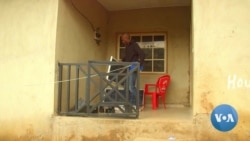A UNICEF-sponsored competition has sparked ideas from some 80,000 Nigerians on community-based solutions to the coronavirus pandemic.
Twenty-eight-year-old Chukwuma Nwachukwu, who was among the winning entrants, pitched the use of solar panels to create a sustainable water supply system to help combat the virus.
"I started developing the idea as soon as I saw the problem," he said. "I also did a couple of researches to also understand how this innovation will be beneficial to the community. One thing that really stood out for me is the fact that this solution is reliable. It is cost-effective."
The COVID-19 Innovation Challenge, for Nigerians ages 14 to 35, was launched in May and continued for six weeks. Each week, there was a new winner for the best idea or innovation to combat the impact of the new coronavirus in Nigeria's communities.
Nwachukwu's solar pump idea was the winner in the first week of the challenge.
"Imagine if a community with a population of over 2,000 people has access to clean water," he said. "This will go a long way in ensuring that people in these communities can easily wash their hands and not transmit the virus."
Other young innovators, such as medical student Habiba Erinfolami, created an online community market for buyers and sellers to carry out transactions while limiting exposure to the virus.
"The reason we are allowing people to only shop from their communities is … we do not want dispatchers to go far away to other communities, thereby exposing themselves," Erinfolami said.
The innovations show how young people can contribute positively in difficult times, UNICEF said.
"Many of us have underestimated the power of the youths in Nigeria. This is evidence that the youth are ready to work and cause a positive change in their families, communities and Nigeria, as well," said UNICEF's Kolawole Ladejobi, project coordinator.
An estimated 60 million Nigerians, or about one-third of the country's population, do not have access to clean and safe water, according to the nonprofit Water Aid.
At a time when proper handwashing and social distancing measures are key to stopping the spread of COVID-19, the UNICEF effort to foster innovations by people like Nwachukwu and Erinfolami can bring hope to Nigeria's communities.





